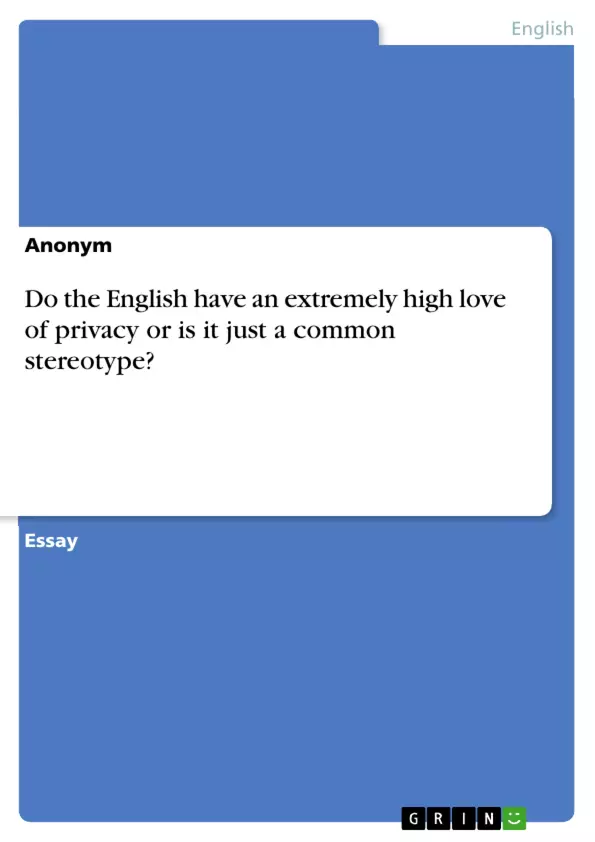“Englishness” is a common word used to refer to special values and characteristics that the English have and that demarcate them from others. Examining English characteristics, you will realize very quickly that privacy, which is defined as “the state of being alone and not watched or disturbed by other people,” (Oxford Advanced Learner’s Dictionary, 2000) is highly regarded in England. Most English people make a clear distinction between the two areas of “private” and “public” life, as it is also stated by Dorsey et al. by saying that “To be a private person is not to be a public person.” (2004). In this matter, the English are conscious of the importance of privacy in their lives; but not all of them are aware of the extent to which privacy regulates their daily life, although it is reflected in their behaviour. The English definitely have an extreme love of privacy that can be seen in various areas of life, such as their house and gardens, their behaviour towards people they know, their behaviour towards unknown people, and their high interest in the protection of personal data.
Inhaltsverzeichnis (Table of Contents)
- The English Love of Privacy
- Privacy in English Homes and Gardens
- Privacy in Interaction with Known People
- Privacy in Interaction with Unknown People
- Privacy and Personal Data
Zielsetzung und Themenschwerpunkte (Objectives and Key Themes)
This text aims to explore the stereotype that the English have an extremely high love of privacy. It examines the various areas of life where this characteristic is displayed, providing evidence from both anecdotal observations and academic research.
- The importance of privacy in English culture and its impact on daily life
- The role of physical spaces, such as homes and gardens, in creating and maintaining privacy
- How privacy influences social interactions with both known and unknown individuals
- The English perspective on the protection of personal data and its implications for national identity schemes
- The relationship between language, cultural values, and the concept of privacy
Zusammenfassung der Kapitel (Chapter Summaries)
- The English Love of Privacy: This introductory chapter establishes the concept of privacy as a defining characteristic of “Englishness” and sets the stage for exploring the various aspects of this phenomenon.
- Privacy in English Homes and Gardens: This chapter examines the importance of physical spaces, such as homes and gardens, in achieving and maintaining privacy. It highlights the English preference for detached houses with separate gardens, the use of fences and hedges, and the underlying cultural values that contribute to this approach.
- Privacy in Interaction with Known People: This section focuses on the English approach to social interaction with acquaintances and close friends. It analyzes the importance of maintaining a certain distance, both physical and conversational, to ensure individual privacy. The text also discusses the role of language and cultural norms in shaping these interactions.
- Privacy in Interaction with Unknown People: This chapter explores the English tendency to avoid social interaction with strangers, highlighting their preference for maintaining distance, avoiding physical contact, and limiting personal disclosures. It delves into the underlying motivations and cultural norms that drive this behavior.
- Privacy and Personal Data: This chapter examines the English concern regarding the protection of personal data, particularly in relation to national identity schemes and online information sharing. It analyzes the potential for intrusion on individual privacy and the arguments against such policies.
Schlüsselwörter (Keywords)
This text primarily focuses on the concept of privacy in English culture. Key keywords include: privacy, Englishness, cultural values, personal space, social interaction, personal data, national identity, and cultural stereotypes. The text draws on various academic studies and cultural observations to support its analysis.
Frequently Asked Questions
Is the English love of privacy a real trait or just a stereotype?
Research suggests it is a deeply rooted cultural value that regulates daily behavior, though not all English people are consciously aware of its extent.
How is privacy reflected in English homes and gardens?
The preference for detached houses, high fences, and hedges serves as a physical barrier to protect the private sphere from the public eye.
How do English people interact with strangers regarding privacy?
English social norms often involve maintaining physical distance and avoiding personal disclosures or intrusive questions when interacting with unknown people.
What is the English attitude toward personal data protection?
There is a high level of skepticism regarding national identity schemes and data sharing, as these are often perceived as intrusions into individual privacy.
How does the English language reflect privacy values?
The clear distinction between "private" and "public" in English culture is mirrored in linguistic politeness strategies that aim to avoid "disturbing" others.
- Citation du texte
- Anonym (Auteur), 2009, Do the English have an extremely high love of privacy or is it just a common stereotype?, Munich, GRIN Verlag, https://www.grin.com/document/1360399



